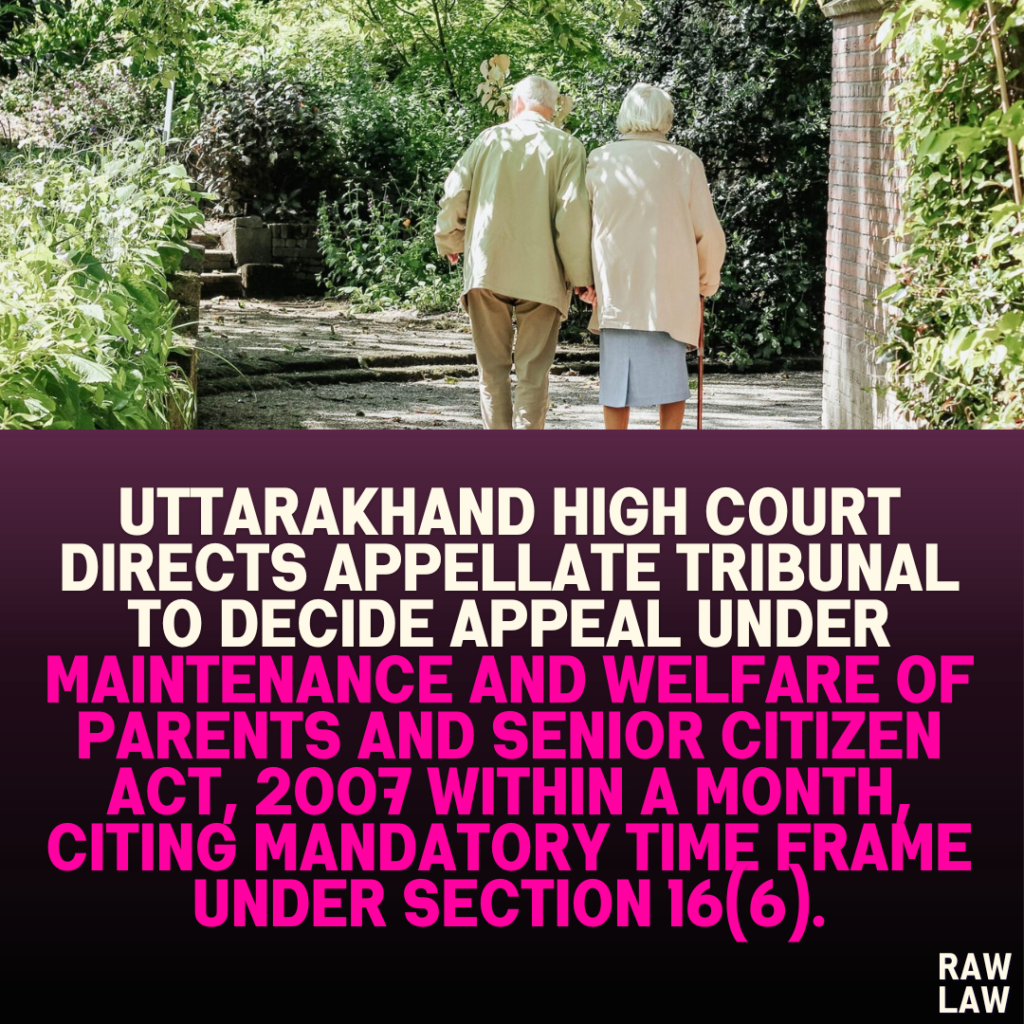Court’s Decision:
The Uttarakhand High Court directed the Appellate Tribunal/District Magistrate, Udham Singh Nagar to decide the Tribunal Appeal No. 51/13 of 2023, filed by the petitioner under the Maintenance and Welfare of Parents and Senior Citizens Act, 2007, within a period of one month from the date of this order. The court emphasized the mandatory nature of Section 16(6) of the Act, which states that appeals should be decided within a month of receipt. The petition was allowed, and the Tribunal was urged to comply with the statutory timeline.
Facts:
The petitioner, a senior citizen, initially filed an application under Section 5 of the Maintenance and Welfare of Parents and Senior Citizens Act, 2007 before the Prescribed Authority/SDM, Jaspur, seeking maintenance from her son and daughter-in-law. This application, registered as Misc. Case No. 23 of 2022, was dismissed by the authority on July 19, 2023. Aggrieved by this decision, the petitioner filed an appeal under Section 16 of the Act before the Appellate Tribunal, which is constituted under the District Magistrate, Udham Singh Nagar, on August 17, 2023. Despite the statutory provision mandating a decision within one month, the appeal remained undecided.
Issues:
Whether the Appellate Tribunal failed to adhere to the mandatory provision under Section 16(6) of the Maintenance and Welfare of Parents and Senior Citizens Act, 2007, which requires that an appeal be decided within a period of one month from the date of receipt.
Petitioner’s Arguments:
The petitioner contended that the Appellate Tribunal was legally bound to decide the appeal within a period of one month as prescribed under Section 16(6) of the Act. Despite the lapse of the statutory period, no decision had been made on the appeal, which warranted a direction from the High Court to ensure compliance.
Respondent’s Arguments:
The respondents did not present substantial arguments against the petitioner’s claims and merely stated the factual position that the appeal was still pending before the Appellate Tribunal.
Analysis of the Law:
Section 16(6) of the Maintenance and Welfare of Parents and Senior Citizens Act, 2007, clearly stipulates that the Appellate Tribunal shall make an effort to decide the appeal within one month from the date of its receipt. The court noted that the provision uses the word “shall,” which indicates a mandatory intent. Any deviation from this prescribed timeline defeats the objective of providing timely relief to senior citizens, which is the essence of the statute.
Precedent Analysis:
The judgment did not reference any prior cases or precedents. The court relied solely on the clear statutory provision under Section 16(6) of the Act to reach its conclusion.
Court’s Reasoning:
The court emphasized the mandatory nature of Section 16(6), stating that the word “shall” signifies a legislative intent to enforce strict compliance. The court held that when an appeal is not decided within the stipulated period, it leads to unnecessary delays, depriving senior citizens of their legal rights. The purpose of the statute is to ensure a swift and effective remedy for elderly citizens facing neglect or lack of support, and thus, the Tribunal must prioritize the disposal of such cases.
Conclusion:
The High Court allowed the writ petition and directed the Appellate Tribunal to decide the appeal within one month from the date of the order. It stressed the need for adherence to statutory timelines to uphold the spirit of the Maintenance and Welfare of Parents and Senior Citizens Act, 2007.
Implications:
This judgment reinforces the importance of adhering to statutory timelines under the Maintenance and Welfare of Parents and Senior Citizens Act, 2007. It serves as a reminder to Appellate Tribunals and authorities to expedite the disposal of appeals involving senior citizens, ensuring that the legislative intent behind such provisions is upheld. Non-compliance with the timeline prescribed under Section 16(6) can lead to judicial intervention, as seen in this case, thereby compelling authorities to act promptly in matters involving vulnerable sections of society.




Pingback: Madras High Court Affirms Acquittal: "Benefit of the Doubt Should Lean Towards the Accused Unless Evidence Is Irrefutable" - Raw Law
Pingback: Supreme Court Quashes Criminal Proceedings Against Wives of Principal Accused in Bank Fraud Case Involving Fake Mortgage Documents, Observes "Continuance of Proceedings in Light of Settlement Would Cause Oppression and Prejudice" Despite CBI’s